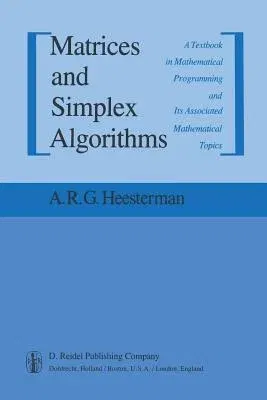Aaart R Heesterman
(Author)Matrices and Simplex Algorithms: A Textbook in Mathematical Programming and Its Associated Mathematical Topics (1983)Paperback - 1983, 8 November 2011

Qty
1
Turbo
Ships in 2 - 3 days
In Stock
Free Delivery
Cash on Delivery
15 Days
Free Returns
Secure Checkout
Print Length
766 pages
Language
English
Publisher
Springer
Date Published
8 Nov 2011
ISBN-10
9400979436
ISBN-13
9789400979437
Description
Product Details
Author:
Book Edition:
1983
Book Format:
Paperback
Country of Origin:
NL
Date Published:
8 November 2011
Dimensions:
23.39 x
15.6 x
4.06 cm
ISBN-10:
9400979436
ISBN-13:
9789400979437
Language:
English
Location:
Dordrecht
Pages:
766
Publisher:
Weight:
1102.23 gm

